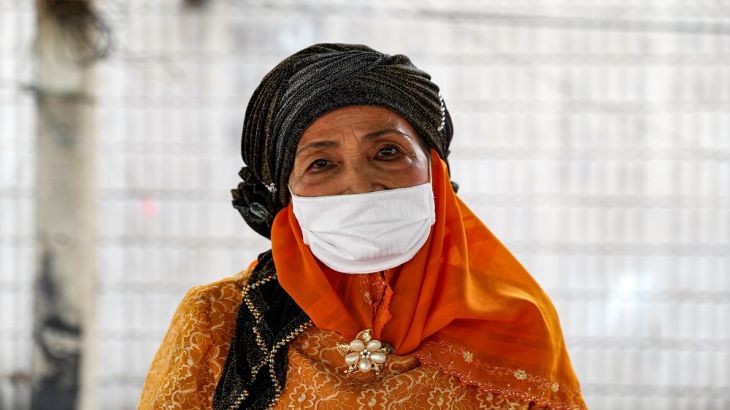Unprecedented virus lockdown as Muslims mark Ramadan
Holy daytime fasting month will be a sombre affair for many across Asia, the Middle East and North Africa.

Muslims around the world began marking Ramadan under coronavirus lockdown on Friday with unprecedented bans on family gatherings and mass prayers, while a pushback in some countries sparked fears of a surge in infections.
This year, the holy daytime fasting month will be a sombre affair for many across Asia, the Middle East and North Africa.
Keep reading
list of 3 items5 questions everyone asks about Ramadan
Ramadan 2020: Fasting hours around the world
Widespread rules have been imposed banning praying in mosques or meeting relatives and friends for large “iftar” meals at dusk – a centrepiece of the month-long fast.
Saudi Arabia’s King Salman said he was saddened that Muslims could not pray at mosques because of coronavirus restrictions.
“It pains me to welcome the glorious month of Ramadan under circumstances that forbid us of prayers in Mosques and of performing the Ramadan prayers of Tarawieh and Qiyam in House of Allah. All this is due to the protective measures taken to save lives and human wellbeing in light of the global threat of COVID-19,” he said in a statement cited by the state SPA news agency.
Saudi Arabia announced last week the two holy mosques in Mecca and Medina would remain closed throughout Ramadan.
|
|
Ramadan is the holiest month for Muslims, in which they fast during daylight hours, congregate for prayers and share meals as a community.
But because of coronavirus, almost all Muslim-majority countries have closed mosques and asked people to pray at home in addition to imposing curfews to limit the spread of the deadly virus.
“I can’t remember anything like this happening before,” Mohd Faizal Musa, a research fellow at the National University of Malaysia’s Institute of the Malay World and Civilization, told Al Jazeera.
Coronavirus has left many in the blockaded Gaza Strip wondering how they will manage this year.
“The markets and mosques are closed. The good people who give us money or aid each Ramadan are facing a tough situation,” said 47-year-old Palestinian Salah Jibril, who is unemployed.
He and his wife live with their six children in a cramped two-bedroom flat on the outskirts of Gaza City.
Jibril said his family normally counted on using the assistance they received during Ramadan to help them throughout the rest of the year.
“This is the hardest Ramadan we have faced. We don’t know how we will cope,” he said.
‘I’m not worried’
Restrictions have put a damper on spirits in Indonesia, the world’s biggest Muslim majority nation, where national religious organisations have called on the faithful to stay at home.
“This Ramadan is very different – it’s just not festive,” said Indonesian housewife Fitria Famela.”I’m disappointed that I can’t go to the mosque, but what can we do? The world is different now.”
However, some religious leaders in Asia – home to nearly a billion of the world’s Muslims – waved off fears about the spread of COVID-19.
The top Islamic organisation in Indonesia’s conservative Aceh province publicly bucked a national order to stay at home.
Several thousand worshippers attended evening prayers Thursday at the biggest mosque in the region’s capital Banda Aceh, though crowds were smaller than usual.
“I’m not worried because I’m wearing a face mask and keeping my distance,” said Cut Fitrah Riskiah, one of those taking part.
Mohamad Shukri Mohamad, the top Islamic cleric in the conservative Malaysian state of Kelantan, planned to skip public prayers and family meals – even if it meant not seeing his six children and 18 grandchildren.
“This is the first time in my life that I’ve been unable to go to the mosque,” he said. “But we must accept it and obey the rules of social distancing to protect our lives.”
|
|
Total lockdown
Several Arab countries have eased restrictions on the occasion of the holy month, with Saudi Arabia, the United Arab Emirates (UAE), Egypt and other countries reducing the duration of the lockdowns.
The UAE said on Thursday that it has decided to ease a total lockdown to an eight-hour nightly curfew and also moved to partially reopen malls and markets.
In Egypt, all Ramadan activities, including charity tables and group iftars are banned.
Month-long Ramadan bazaars with stalls selling food, drinks and clothes, usually busy sites, are not allowed in Malaysia, Brunei and Singapore.
In Iran, the region’s hardest-hit nation, Supreme Leader Ayatollah Ali Khamenei has called on people to avoid collective prayers.
Meanwhile, Pakistan will allow congregational prayers at mosques during Ramadan, but worshippers must keep a distance of two metres (six feet) from each other and are encouraged to bring their own prayer mats.
At Jerusalem’s Al-Aqsa Mosque compound, which will be closed to Muslim worshippers throughout Ramadan, the call to prayer will still take place five times a day, and religious workers allowed entry.
Mosques in the United Kingdom and elsewhere will live-stream sermons, recitation of the Quran and prayers.
Muslims will also be able to attend religious lectures via video-conferencing app Zoom, Facebook and YouTube.
Fasting during Ramadan is one of the five pillars of Islam, along with the Muslim declaration of faith, daily prayers, charity, and performing the Hajj pilgrimage to Mecca.
In Muslim-majority countries, offices are required by law to reduce working hours, and many restaurants are closed during the daylight hours.
|
|